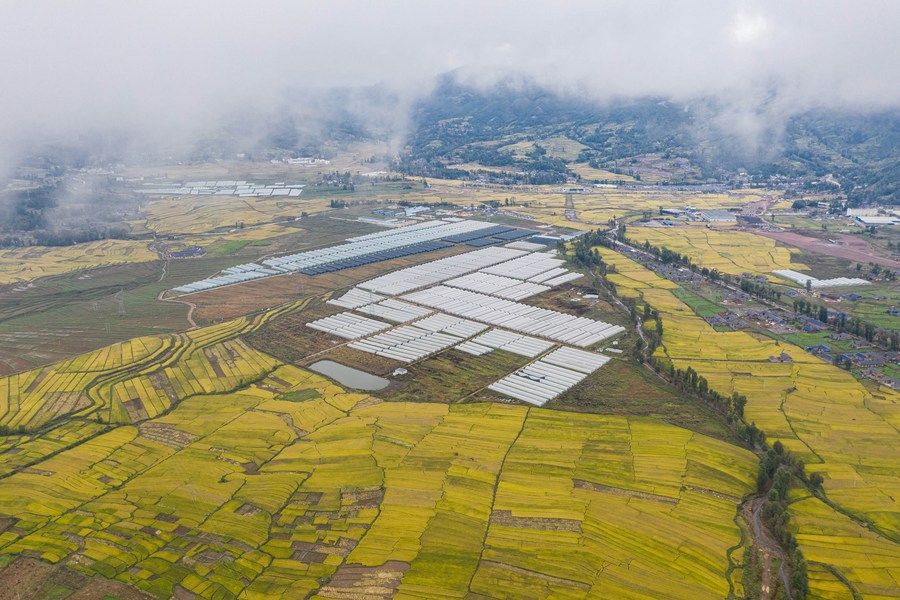Lifeline of prosperity: farmland protection

A farmer works in the fields at Linquan Township, Qianxi County, southwest China's Guizhou Province, March 21, 2019, also the day of "Chunfen". (Xinhua/Tao Liang)
BEIJING, March 20 (Xinhua) -- Chunfen, or spring equinox, is an important date for Chinese farmers. Not only is it one of the 24 solar terms on the Chinese lunar calendar that reflect changes in the seasons, but it also signals the start of one of the year's busiest farming periods. This year, Chunfen falls on March 20, and farms across the country are already a hive of activity.
Away from the hustle and bustle of the fields and farms, a city dweller keeps a close eye on the country's agricultural developments in the heart of Beijing.
Farmlands are the lifeline of grain production and long-term prosperity of the Chinese nation, President Xi Jinping said during this year's "two sessions." His comment was made during a discussion on grain security.
As the linchpin of grain security and the source of bread and butter, farmlands must be protected. However, Xi noted that land encroachment, data fabrication, and other problems were a blight on the use of arable lands.

Aerial photo taken on Feb. 17, 2022 shows an agricultural vehicle leveling farmland in fields in Daping Village of Taoyuan County, central China's Hunan Province. (Xinhua/Chen Sihan)
"Farmlands should remain farmlands and must be fertile," Xi said, stressing that nationwide farmland must remain above 120 million hectares.
Xi has not always been an urbanite, and his opinions on agriculture are based on real, lived experience; from his years as a farmer in his youth right up to his many trips across the country as a top leader, he has gained first-hand information about the land and crops growing on it.
He has walked across wheat fields in Anhui Province in the springtime, examined the corn crops on the black soil of Jilin Province, and picked up a handful of golden rice ears in the northernmost province of Heilongjiang.
In 2020, when many farms faced a two-pronged onslaught of COVID-19 and natural disasters, Xi headed to Jilin to speak directly to the farmers. "I am very concerned about how the crops grow here in northeast China," Xi said while walking in the corn fields.

Aerial photo taken on Oct. 13, 2020 shows the farmland and agricultural industry park at Abingluogu Town in Zhaojue County, Liangshan Yi Autonomous Prefecture, southwest China's Sichuan Province. (Xinhua/Zhang Xiaoyu)
Known for its fertile black soil, the vast swathes of land in northeast China produce a quarter of the nation's grain and play a significant role in ensuring grain security. As such, when Xi said that effective measures must be taken to preserve and protect the black soil for the benefit of the generations to come, his comments were not on a limb.
During this year's "two sessions," Xi reiterated that farmlands should be protected with policies that "have teeth." In fact, the top agricultural policy document released earlier this year has also prioritized farmland protection.
According to the 2022 "No. 1 central document," the country will develop 6.67 million hectares of high-standard farmland, promote national projects on black soil protection, and launch the third nationwide soil condition census.
However external environment changes, for Xi, bumper harvests have always been an important source of gratification.
This sentiment was expressed by Xi last year in his message to farmers and agricultural workers on the eve of the Chinese farmers' harvest festival, writing that bumper harvests have played an important role in the country's efforts to make new advances and maintain overall stability, especially given the difficulties the country has overcome.
Photos
Related Stories
- Chinese Wisdom in Xi's Words: "Peace is precious"
- Xi signs order to promulgate rules on regulating military equipment procurement contracts
- Xi has candid, in-depth exchange of views with Biden
- Xi, Biden exchanging views on China-U.S. ties, issues of common concern
- Chinese Wisdom in Xi's Words: "Be vigilant in times of peace"
Copyright © 2022 People's Daily Online. All Rights Reserved.










